Archive for January, 2011
Saturday, January 22nd, 2011
I wouldn’t say the afterglow of England’s Ashes victory has faded, but it’s been tempered slightly by two consecutive losses in this ODI series.
The comedown was perhaps inevitable. England losing two on the trot was not.
After all the joy, the celebration, the glitter cannons, the starry-eyed dream of climbing up the Test rankings, we return to a format at which England are a bit shit.
Not that Australia have been all that great shakes at it either in these two matches, though the results may suggest otherwise. At no time has it been particularly obvious, at Melbourne and at Hobart, that you were watching the no.1 ODI side in the world, and the team that won the Ashes.
Shane Watson won it for Australia in Melbourne; Shaun Marsh, filling in for a hamstrung Mike Hussey, won it for them in Hobart. Both were superb performances. Watson’s knock has, rightly, been hailed one of the great One Day innings, and the inevitable cries of “where has he been?” accompanied Marsh’s century celebrations. There are probably more than a few Australian fans who are hoping Mike Hussey stays stuck in rehab for a bit longer.
Aside from that, it’s mostly been a case of the mediocre versus the barely competent.
England were all out for 184. Their batting was diabolical. Those who performed with the bat at Melbourne failed at Hobart. Steven Davies was dropped in favour of Matt Prior, who coach Andy Flower has decided will keep wicket in the World Cup. Matt Prior went for a duck. What Davies thinks about all this is unrecorded.
There was no way Australia should have been allowed to win with a total of 230. With the exception of Marsh’s brilliant innings, the bar was set low and England still couldn’t get over it.
England’s total batting first at Melbourne was 294 and they didn’t win there, either. The well oiled machine from the Tests, translated to this format with some tweaking, is looking slightly creaky.
It’s true that England are approaching this series as a working laboratory with an eye to selection for the World Cup. So far it’s not really going to plan.
Michael Yardy, picked for the WC squad, sent down dross at Hobart for the most part but ensured ongoing selection confusion by taking two wickets. Chris Woakes, hero of the Adelaide T20, should have played at Hobart instead of James Tredwell. Tredwell is in England’s World Cup squad. The man with the best bowling figures in this match, Chris Tremlett, is not.
Speaking of the World Cup squad, Ravi Bopara must be wondering whether he will ever play for England again, and it looks like management still have no idea what in the world to do with Adil Rashid.
None of this is really filling me with any confidence. Sometimes I wonder whether my growing antipathy towards the ODI format is because England have never been particularly good at it. Perhaps if I was an India fan, I would feel differently.
There are five more matches in this series to go. My patience is running out with these ODIs and there have only been two of them. It would be nice if England could win the next one.
The bloated behemoth that is the World Cup is now slowly heaving its unwieldy corpus over the horizon, blotting out the sun and laying waste to TV schedules and sleep patterns everywhere for the next two and a half months .
God help us all.
Monday, January 17th, 2011
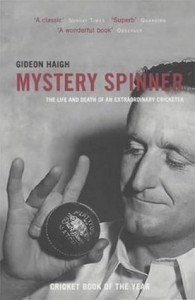
It took me three weeks to read Gideon Haigh’s Mystery Spinner, but I do have a good excuse.
I started it on an outbound flight to Melbourne three weeks ago and, as you can imagine, subsequent events kind of demanded my full attention from then on.
Back in Blighty, with the Ashes retained and a series won, I was finally able to give it my undivided attention. This would mostly occur at 3AM, in short bursts of intense reading, mind awake and alert, body fighting through the weighty sludge of jet-lag and a final 48 hours of my trip with no sleep.
I am sure this added to the experience. Not many folks are awake in the early hours of the morning, save for new parents, serial killers, and Margaret Thatcher. Depressives, too: 4:48AM is supposed to be the time at which most suicides occur.
Jack Iverson did not take his own life at 4:48AM. He died from a self-inflicted gunshot wound to the head during the afternoon of Tuesday, 23rd October, 1973, in the shed at the rear of his house.
It was a lonely end to the life of an ordinary man who had a brief but extraordinary cricket career, a man who is little remembered now but who was, for the duration of most of his short career, feared by batsmen and deemed unplayable.
Iverson was a one-off, a freak. He honed his remarkable thumb and middle finger grip with a table-tennis ball before taking up French cricket while stationed at Port Moresby in New Guinea as part of the Australian Imperial Force. He ended up playing for Victoria, winning the Ashes for his country at the Sydney Test of 1951 with a haul of 6 wickets for 27 runs.
He played in only 5 Tests, but when he retired it was with the remarkable figures of 21 wickets at 15.23.
His career was plagued by at-times crippling self-doubt and pressure from a father who wanted his son to carry on the family real estate business. Iverson voiced his first thoughts of retirement after playing in only his first Test, and lived in fear of “being found out”, that he just wasn’t good enough.
Shy, inward looking, personable but not extrovert, he was diagnosed in 1968 with depression, exacerbated, Haigh postulates, by cerebral arteriosclerosis, a narrowing of blood vessels to the brain. He was given electroconvulsive therapy and anti-depressants, which he sometimes refused to take in the belief that they were not working.
With those who suffer depression, small disappointments can often seem catastrophic. Iverson’s wife described to police that on the day her husband killed himself that she had found him sitting in the lounge room “upset and shaking visibly”. He had learned that the man to whom he had sold his real estate company had not adhered to a previously agreed financial arrangement and that he was owed commission on the sale of a house.
After apparently calming down, he went out the back to the shed. Mrs Iverson began vacuuming, and so did not hear the shot that killed him.
Because Iverson’s career was so short, Haigh found he task of researching his life sometimes a difficult one.
‘The man who lived “in my own quiet way” left little behind; no published works, no journals, no boxes of correspondence, only some photos, statistics, reportage of his feats and a scattering of others’ recollections. As I traced his fugitive figure, I often learned more than I had expected, but less than I wanted.’
This book put me in mind several times of Ian Hamilton’s In Search of JD Salinger, in that, as in the case of Hamilton’s famously reclusive subject, Mystery Spinner is as much a meta-biography, the story of a writing of a biography, as much as it is a biography itself.
There is necessarily some padding – Haigh devotes 35 pages to a history of bowling in general and spin bowling in particular, but this is a minor quibble, and it does place Iverson’s abilities and achievements in context.
He also makes the point that because Iverson came late to the game, he arrived on the international stage with a fully-formed technique developed and untampered with by the meddling of coaches – a single-minded auto-didacticism shared with other greats of the game, such as Trumper, Bradman, and O’Reilly.
In the end, I suppose the question is, how much can we really know about a man from his achievements in the sporting arena?
With some, such as Victor Trumper, their greatness outlives them to such an extent that some details of their lives inevitably become subject to embellishment or exaggeration.
In Jack Iverson’s case, his grip on a cricket ball is more familiar than his face.
Haigh treats his subject with sensitivity and respect, and the result is a work which succeeds admirably, not just on the level of biography, but in the treatment of a uniquely talented but deeply troubled individual who, for an all-too-brief period, made cricket history.
Mystery Spinner, by Gideon Haigh, Aurum Press 2002.
Friday, January 7th, 2011
Days don’t come much better than this.
This morning:
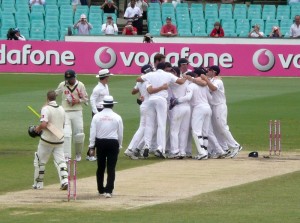

This afternoon:


These were my two main reasons for coming to Australia: to see the England team make cricket history, and to pay homage at the grave of a man who was cricket history.
It has been an emotional day, and I am very tired.
I am also very happy.
I wonder whether it is even possible to have another day that could possibly be better than this one.
Thursday, January 6th, 2011
Otherwise, there was nothing whatsoever that could have redeemed such a humiliatingly dire performance.
The hosts were all out for 280 in their first innings, could not bowl England out until they had scored the highest total in history of runs in an Ashes Test in Australia, and are now teetering on the brink of an innings and series defeat, with three wickets remaining on a pitch that is still good for batting.
That is the unvarnished reality of how this final Test stands and how it will finish tomorrow when Michael Vaughan presents the Waterford crystal trophy to the 2010-11 Ashes winning captain, Andrew Strauss.
Touted as a competition between two equal (and fairly ordinary) sides, this series has proved anything but. Australia have been outperformed on all levels, with England winning on most instances in a head to head comparison of the members of each team.
Only Michael Hussey can be said to have shown a glimmer of the junkyard dog who would rather chew off its own foot when trapped than wait for the hunter’s bullet, and Peter Siddle has been another unsung warrior whose deeds have gone largely unheralded because he does the basics well rather than promising so much while delivering so infrequently like Mitchell Johnson, and mainly because he is on the losing side.
For England, Graeme Swann has not quite torn Australia apart, with an average so far of 41.78 that if foretold in isolation to match results before this series started would have had England fans fearing for the loss of the urn.
Instead, it is England’s quicks who have stepped up, in particular James Anderson, who would surely share the new ball for any Test nation you could care to name (Anderson and Steyn, anyone? Nope, I would not rate my chances as a batsman either).
Anderson made magic with the ball again today. When Mike Hussey, who lasted for 60 minutes, fell for 12 to Bresnan after having survived an Anderson barrage of hooping, swinging hand grenades, it must have felt like the end to the longest innings of his life.
It is tempting to say that if Ricky Ponting has lost Australia the Ashes, then Michael Clarke has lost them the series, but the problems runs deeper than just captaincy for this team. Rebuilding will be a long and hard process.
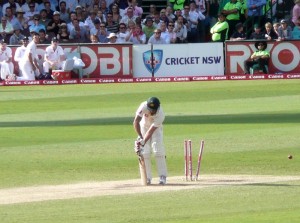 Tremlett smashes Johnson's timbers I cannot possibly end this entry by not commenting on perhaps the most poignant moment of the day. Before play started it was announced on the PA that Paul Collingwood will retire from Test cricket after Sydney.
Collingwood, a player of self-confessed limited ability who has surpassed his own limitations and given steel, heart and backbone to the England team on many occasions, has almost always done the right thing, with perhaps that 2008 incident of the run-out of Grant Elliott at the Oval the only blot on an otherwise honourable and admirable career.
He has admitted he has been struggling for runs in this series, and having failed again in this Test, and with Eoin Morgan waiting in the wings, he has realised it is time, and he has done the right thing.
The final match in an historic series in which England retain the Ashes; the final match in which they win the series; he could have picked no better time to make his announcement.
I admire Paul Collingwood immensely. I admire him for all that gritty, plug-ugly scrappiness at the crease on the occasions when he pulled England’s bacon out of the fire when they were up against it; I admire him for all the impossible catches he took at backward point, in complete defiance of the laws of gravity; I admire him for the bit of ginger he brought to the team – the smashing orangey bit in England’s Jaffa Cake.
While he will continue in other forms of the game, it is hard to imagine an England Test team without Paul Collingwood MBE in it.
His presence will be missed.
Wednesday, January 5th, 2011
Australia are staring down the barrel of another defeat in this last 2010-11 Ashes Test.
Peter Siddle cleaned up nightwatchman Jimmy Anderson early on but Alastair Cook just kept going. And going, and going. By the time Cook fell for 189 he had passed 1000 first class runs for this tour, and with 766 Test runs is second in series runs for an Englishman only behind the great Wally Hammond’s 905.
All this from a man many, myself included, believed should not even be in this Ashes squad.
Paul Collingwood suffered a brainstorm on 13 when he really should have been grinding out much needed runs; his mistimed skier to Ben Hilfenhaus at mid-on was the shot of a man who had never looked comfortable at the crease and whose leaden-footed, ill-timed jabbings at the ball had started to exasperate even himself.
It may be unlikely he will be called upon for a rearguard rescue operation in the second innings. If this proves to be the case I suspect the England management may give him one last opportunity against Sri Lanka when they visit England in May to prove he can represent his country in the Test arena.
England were 226-5 when Ian Bell joined Cook in the middle, and controversy was to follow.
First, Michael Beer was deprived of Cook’s wicket a second time when Phil Hughes took a low catch at short leg that on replay did not carry, though Hughes claimed the catch – albeit after enough time to indicate he was not entirely sure that the catch was clean. It was this aspect, Hughes’ celebration with his team mates, that provoked the ire of sections of the crowd, and much celebration and comments regarding sportsmanship (or lack thereof) when Cook was allowed to carry on.
The most contentious moment of the day, though, came later when Ian Bell was given out caught behind off an inside edge off the bowling of Shane Watson.
Bell consulted with Prior and asked for a review. Hot Spot showed no edge, and onfield umpire Aleem Dar reversed his decision. What has provoked the wrath of many, though, is that Snickometer later showed the edge.
No system is infallible, and whether you consider Ian Bell a cheat or not is down to how far you are prepared to tolerate using a system to your advantage that allows you to do so.
Snickometer is not part of the Decision Review System as it needs a human being to synchronize picture with sound spike; for one, the process takes too long, and secondly, the technology as it now stands is too reliant on the thoroughness or otherwise of its operator to provide a decision-making tool that is within acceptable tolerances.
One could ask why, if it is not part of DRS, why it was shown at all – the answer is that the host broadcaster (in this case Channel 9) can show what the hell they like, and a bit of controversy is always good for ratings.
Bell may be lying when he says he wasn’t sure if he had hit it.
He could also have been telling the truth.
He did nothing wrong according to the current decision making process, and whether his request for a review was because he was confident in his innocence and because he knew that Hot Spot would show nothing, or conversely because he knew Hot Spot does not always show something, is up to the individual to decide where his own tolerances lie.
Bell used the process – as it stands, to his advantage – and while I am not saying the system is perfect, the tendency towards a rose-coloured nostalgia for more gentlemanly, honourable times is a hankering for a utopia that never existed. Cricketers have always ruthlessly used the rules to their benefit, and the great WG himself was not above replacing the bails and continuing to bat on if he felt his dismissal to be a little too previous for his liking.
In the greater context of the match, Bell’s apparent let-off allowed him to continue on his way to an inexorable and beautifully played ton, controversy aside, and Matt Prior too chipped in with a half-century.
Michael Clarke swapped bowlers, and the ends from which they ran in, so damn often it was difficult to tell whether this attack was coming or going – though it was mostly going, and mostly for a shitload of runs.
Granted, England have had the best of the bowling conditions, and today the pitch was probably at its most docile, but the Australian bowling looks as toothless as ever, and captain Clarke looks like a man who is already running out of ideas.
England are currently 488-7, and lead Australia by 208 runs.
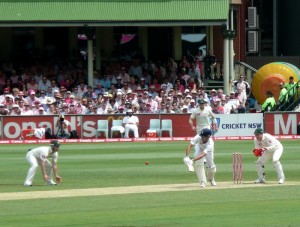 Hughes gets ready to claim the catch
Tuesday, January 4th, 2011
Michael Clarke may not have made much impact with the bat so far in this match, but he made his first tactical decision in batting Brad Haddin in his rightful position ahead of Steve Smith.
Not that it made much difference: a wild swipe at a James Anderson delivery outside off stump proved fatal, and once again it was looking like a case of wickets squandered for the Aussie batsmen.
Paul Collingwood got one of the loudest cheers of the day when he when he bowled Mike Hussey with the last delivery with the old ball, which Hussey inside-edged onto his stumps, while Steve Smith succumbed to an airy nonsense of a shot when he really should have known better.
Anderson struck again in the same over to remove Siddle, and the possibility of Australia laboriously dragging themselves to a score beyond 200 looked extremely shaky.
I suppose you could class Mitchell Johnson as an allrounder, but you could also say that he approaches his job with the bat like a bowler given carte blanche to have a hit. At the same time, he can play shots that would not disgrace one of his batting brethren further up the order.
Between them, he and Ben Hilfenhaus took the score to 265 before Bresnan got Johnson going for the big heave and taking the top of his off stump, ending an innings of 53 in which he’d taken a particular liking to Graeme Swann, hitting him for 6 over midwicket followed by 4.
That this entertaining half century was accompanied by chants from the crowd slagging off Johnson’s bowling seemed strangely illogical: perhaps an amended version which ends “his batting’s alright” rather than “his bowling is shite” could be used when he’s wielding the willow.
Mitchell did serve up some shite when, after his side were bowled out for 280, Michael Clarke made the second tactical decision of his nascent Test captaincy and had Johnson share the new ball with Hilfenhaus.
This proved costly. Strauss and Cook reacted by batting as if they were opening the innings in an ODI. England’s opening partnership has rarely looked so dynamic.
Clarke looked strangely unperturbed. This was not popular with a lot of people. A few of the Australians sitting near me got quite irate. In a recent newspaper poll, only 15 per cent of readers thought Michael Clarke should be Australian captain. I’m sure 99 per cent of that 15 per cent were wondering if they were possibly inebriated at the time.
Finally, Hilfenhaus, going round the wicket, prompted a rash shot from Strauss at a full inswinger, and only one run had been added before Johnson went on a roaring celebration with the wicket of Trott for nought; a rare failure for England’s number three.
I had originally intended this article to be composed entirely of puns centred around the surname of Australia’s new (or “latest”, if you prefer) spin bowler, basically just to piss people off. But instead I would rather confess I am warming to Mr Beer.
Whether it was the whole-hearted way in which he entered into proceedings, the fact he actually got the odd one to turn, his crestfallen disappointment and dirt-kicking fury at being denied the wicket of Alastair Cook off what transpired to be a no-ball, or his ability to steady his nerves after this long enough to take a catch at deep backward square to remove Kevin Pietersen who had pasted him for a boundary first ball.
I still think Nathan Hauritz should be Australia’s spinner. But I will also be watching Beer’s progress tomorrow with renewed interest.
England are 167-3 and may be left regretting that they let that Johnson-Hilfenhaus rearguard partnership get away from them. With the crucial wicket of Pietersen gone, the game now feels uncomfortably in the balance.
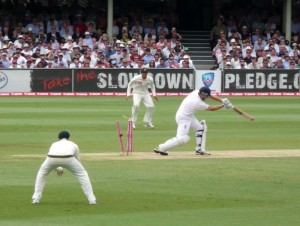 Trott b. Johnson 0
Monday, January 3rd, 2011
It was a stop-start kind of day at the SCG.
For some it never really got going.
For one man, it was the start of what could be a fruitful Test career.
Before I go any further, I must hasten to add that while the plaudits for today’s knock of 37 from NSW Test debutant Usman Khawaja have been flowing steadily since he walked off to a standing ovation, while his mother fought back tears of pride, one would do well to exercise caution when praising this young man who seemed to bat so assuredly.
After all, look how well that’s turned out for Phillip Hughes. New messiahs, while loudly heralded, often have the nasty habit of being found wanting.
However, it’s hard not to get excited about this young man’s talent and brio given the moribund performances of most of his teammates lately. When the first wicket has fallen just before lunch and you are next man in, chances are that the meal you are eating is not going to sit easy.
He came to the crease to the sound of loud applause and the atmosphere around the ground, from England and Australian fans alike, was of immense goodwill towards him. Everyone wanted him to do well today. Maybe not too well, in the case of the England fans, but 100 for “Usie” and Australia all out for less than 300 would have been acceptable.
Khawaja did not get 100; nor did he reach 50. But his first 15 runs came off 8 balls including a glorious pull shot off only the second ball he faced from Chris Tremlett, and shot of the day was a blazing square drive off Tim Bresnan so flamboyant his bat should have had banners flying from it. To say it was a shot of awesome power and beauty scarcely does it justice.
The best thing, though, was when afterwards he said how much he enjoyed being out in the middle. On current form, most of Australia’s batsmen are so busy wondering where the next run is coming from that even the mere concept of gleaning pleasure from their chosen sport must seem a heresy.
Michael Clarke was definitely one who would rather wipe today from the memory banks. Newly anointed as Australia’s 43rd Test captain, 4 runs were all he could manage from an innings interrupted by rain before he edged Tim Bresnan to Jimmy Anderson at gully.
Clarke came to the crease to boos from the sell-out crowd, and left to more of the same.
Two men making their debut in different capacities for their country; one so far with conspicuously more success than the other.
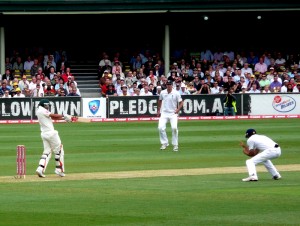 Usman Khawaja on debut at the SCG
Sunday, January 2nd, 2011
Tom Parker, the curator at the SCG, has predicted that wicket no. 5 will be a spinner’s dream from day three. The ball may do a bit through the air during the first session of day one, but from then on the hard-packed Bulli soil will be a batter’s deck until the cracks start appearing.
This forecast, of course, is predicated on five days of glorious weather with no rain. I write this about hour after a thunderstorm descended upon Sydney, bringing a refreshing coolness and giving some relief to my beleaguered sinuses. More importantly though, there is still dampness in the air, and further showers are predicted tomorrow, with overcast conditions over the next two days.
Perhaps this might just be a good toss to lose.
In any event, it goes without saying that England go into this last Test better prepared for anything the weather may throw at them.
This is the last Test in a series in which the main prize is no longer up for grabs, but England will be striving for domination and a series victory as a further stepping stone on the road to the eventual goal of being Test cricket’s number one.
Australia will similarly be looking to lay stepping stones, but towards the more modest goal of emerging from a series that has seen the stuffing kicked out of them with a win that will give them some heart before they play Sri Lanka in August. Seven months is a long time for wounds to fester.
Australia will have Michael Beer; England have Graeme Swann. Swann has put this succinctly into perspective by saying he still doesn’t understand why NSW homeboy Nathan Hauritz was dumped so ignominiously. He believes Hauritz should have been Australia’s first choice spinner throughout the whole of this series, and he is not the only one.
Usman Khawaja, Australia’s new number three, looked relaxed and cheerful at practice today, and seems to be taking the hullabaloo over his selection as Australia’s first Muslim cricketer in his stride.
The papers recently have been full of articles about him. Khawaja reckons he is singled out for explosives checks at airports, and even at the WACA when playing in a one-dayer against the Warriors he was stopped by three security guards on his way to the dressing room who did not believe he played for NSW.
He laughs all this off and treats the whole thing with an admirable sense of humour; I think mine would probably have run out a long time ago.
He plays Call of Duty on his PS3 and plays his guitar in his spare time. The newspapers seem to be making a big deal out of the fact that he is a normal 24-year old (and why shouldn’t he be?) and at the same time investing him with the responsibility of being a role model and ambassador for Australia’s Islamic community.
I wish it did not have to be this way, where so much attention seems to be on his faith, but there it is. I really wish they would all just let the guy play.
Michael Clarke will be hoping to prove his naysayers – of which there are many – wrong as he becomes his country’s 43rd Test captain. Judging by his form of late, and doubts over his captaincy credentials, “Pup” must find his inner mongrel is he is to win his critics over.
England have an embarrassment of riches to choose from with their stable of quicks, but I expect the side to remain unchanged from Melbourne.
Paul Collingwood is this week’s ant under the batting magnifying glass, and needs runs desperately to avoid being sizzled to a crisp by the ever increasing glare of scrutiny. Few come tougher than him, though, and scrappers like Collingwood never stay down for long.
This Test will be an interesting one, imbued with importance, especially for Australia.
The urn is gone, but it is now their long-term future that is important.
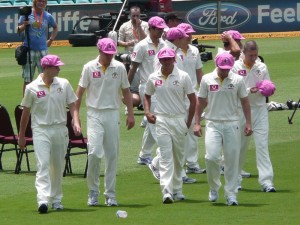 Usman Khawaja and teammates in their Baggy Pinks at the SCG today
|
|









